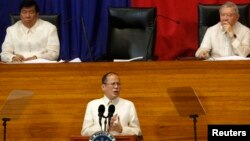MANILA —
Tensions between the Philippines and China continue to escalate this week. The Philippines says a visit by President Benigno Aquino to the China-ASEAN Expo in Nanning, China, had stipulations. China had said it never invited President Aquino.
The Philippines is the country of honor at this year’s China-ASEAN expo. And according to Philippine officials, the tradition is to send the head of state of the country of honor to the event.
Philippine Foreign Affairs Spokesman Raul Hernandez said President Aquino was invited to the event, but with certain conditions set forth by China. He read a statement during a news briefing in Manila Monday.
“And such conditions were absolutely inimical to our national interest. To avoid embarrassment on the Chinese side, we will not state these conditions,” said Hernandez.
The spokesman added that Chinese Foreign Ministry officials told Philippine officials not to talk about the conditions and not to have any discussion about them at the ministerial level.
Aquino had announced he would be attending, but less than a day after his announcement, word came that China had asked him to cancel his trip. Philippine officials say China said he should come at “a more conducive time.” China’s Foreign Ministry said it never invited the president and gave no further details.
Chill in relations
The two countries have been locked in a diplomatic dispute over territories in the resource-rich South China Sea. Relations chilled in April last year when ships from both countries faced off at a shoal near the northwestern coast of the Philippines. Manila says the shoal is well within its exclusive economic zone -- as designated by the United Nations Convention on the Law of the Sea.
China blocked off a lagoon area of the shoal, which it claims is part of its fishing grounds. The Philippines has complained of other instances of Chinese surveillance and military ships in the vicinity of its claimed waters.
Manila has filed dozens of protests and is taking its case before a U.N. arbitration tribunal. Beijing rejected the case and has not responded to any procedural requirements. It again reiterated its preference for one-on-one dialogue.
China asserts “indisputable sovereignty” over the South China Sea. The Philippines, Vietnam, Malaysia, Brunei and Taiwan also have competing claims in the sea.
Zhang Hua, a Chinese embassy spokesman in Manila, did not comment on the so-called conditions. But Zhang said in a statement that China values the “long-standing friendship” between the two countries.
“Under the current circumstances, China hopes the Philippine side could work together with the Chinese side to overcome difficulties and disturbances and make real efforts to get the China-Philippines relationship back to the track of sound and stable development,” said Zhang.
China is hosting a low-level consultation this month with the 10-member Association of Southeast Asian Nations. They are set to discuss a legally binding code of conduct on managing the disputes in the South China Sea. The Philippines and Vietnam are pushing for full negotiations on the proposed code, which has languished for more than 10 years.
The Philippines is the country of honor at this year’s China-ASEAN expo. And according to Philippine officials, the tradition is to send the head of state of the country of honor to the event.
Philippine Foreign Affairs Spokesman Raul Hernandez said President Aquino was invited to the event, but with certain conditions set forth by China. He read a statement during a news briefing in Manila Monday.
“And such conditions were absolutely inimical to our national interest. To avoid embarrassment on the Chinese side, we will not state these conditions,” said Hernandez.
The spokesman added that Chinese Foreign Ministry officials told Philippine officials not to talk about the conditions and not to have any discussion about them at the ministerial level.
Aquino had announced he would be attending, but less than a day after his announcement, word came that China had asked him to cancel his trip. Philippine officials say China said he should come at “a more conducive time.” China’s Foreign Ministry said it never invited the president and gave no further details.
Chill in relations
The two countries have been locked in a diplomatic dispute over territories in the resource-rich South China Sea. Relations chilled in April last year when ships from both countries faced off at a shoal near the northwestern coast of the Philippines. Manila says the shoal is well within its exclusive economic zone -- as designated by the United Nations Convention on the Law of the Sea.
China blocked off a lagoon area of the shoal, which it claims is part of its fishing grounds. The Philippines has complained of other instances of Chinese surveillance and military ships in the vicinity of its claimed waters.
Manila has filed dozens of protests and is taking its case before a U.N. arbitration tribunal. Beijing rejected the case and has not responded to any procedural requirements. It again reiterated its preference for one-on-one dialogue.
China asserts “indisputable sovereignty” over the South China Sea. The Philippines, Vietnam, Malaysia, Brunei and Taiwan also have competing claims in the sea.
Zhang Hua, a Chinese embassy spokesman in Manila, did not comment on the so-called conditions. But Zhang said in a statement that China values the “long-standing friendship” between the two countries.
“Under the current circumstances, China hopes the Philippine side could work together with the Chinese side to overcome difficulties and disturbances and make real efforts to get the China-Philippines relationship back to the track of sound and stable development,” said Zhang.
China is hosting a low-level consultation this month with the 10-member Association of Southeast Asian Nations. They are set to discuss a legally binding code of conduct on managing the disputes in the South China Sea. The Philippines and Vietnam are pushing for full negotiations on the proposed code, which has languished for more than 10 years.




